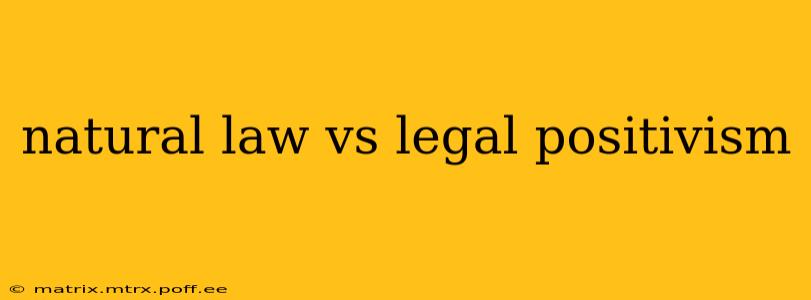The debate between natural law and legal positivism represents a fundamental rift in how we understand the nature of law itself. These two contrasting schools of thought offer distinct perspectives on the relationship between law, morality, and the state, shaping our understanding of justice, human rights, and the legitimacy of legal systems. This exploration delves into the core tenets of each philosophy, highlighting their key differences and examining their implications for contemporary legal practice.
What is Natural Law?
Natural law theory posits that there exists a universal moral order inherent in human nature, discoverable through reason and independent of human-made laws. These inherent moral principles are considered superior to positive law (laws created by human beings) and serve as a benchmark against which the validity of positive law can be judged. If a positive law contradicts natural law, it is considered unjust and lacks moral authority.
Key tenets of natural law theory include:
- Universal moral principles: These principles are believed to be applicable to all people, regardless of time, place, or culture. Examples include the prohibitions against murder, theft, and betrayal.
- Inherent human dignity: Natural law emphasizes the inherent worth and dignity of every human being, implying fundamental rights that should be protected.
- Reason and conscience: Humans are believed to possess the capacity to discern these moral principles through reason and conscience.
- Higher law: Natural law acts as a higher law, a standard by which human-made laws are evaluated for their justice and legitimacy. Laws conflicting with this higher law are deemed invalid or unjust.
Prominent figures associated with natural law theory include Aristotle, Cicero, Thomas Aquinas, and John Locke.
What is Legal Positivism?
In contrast, legal positivism argues that law is solely a matter of social fact. It emphasizes the importance of positive law—the rules and regulations enacted by a legally constituted authority—and rejects the idea that morality plays any essential role in defining what constitutes law. For legal positivists, the validity of a law depends solely on its source and the procedures used to create it, not on its moral content.
Key tenets of legal positivism include:
- Separation of law and morality: Positivists maintain a strict separation between the "is" (what the law is) and the "ought" (what the law should be). A law can be valid even if it is morally repugnant.
- Authority of the state: The law's authority derives from its creation by a legitimate sovereign or legislative body.
- Emphasis on social facts: Law is viewed as a social construct, its content determined by the rules and practices of the relevant political community.
- Formal criteria of validity: Positivists emphasize formal criteria (e.g., proper legislative enactment) for determining whether a rule qualifies as law.
Key figures associated with legal positivism include Jeremy Bentham, John Austin, and H.L.A. Hart.
What are the main differences between natural law and legal positivism?
The core difference lies in their approaches to the relationship between law and morality:
| Feature | Natural Law | Legal Positivism |
|---|---|---|
| Source of Law | Inherent moral principles, human reason | Positive enactment by a legitimate authority |
| Law & Morality | Law must conform to morality; morality is a criterion for legal validity. | Law and morality are distinct; morality is irrelevant to legal validity. |
| Validity of Law | Valid law reflects natural moral principles. | Valid law is created through proper procedures. |
| Role of Judge | Judge applies natural law principles to determine justice. | Judge applies positive law, regardless of moral content. |
What is the relationship between law and morality according to legal positivists?
Legal positivists don't deny the existence of morality or its importance. However, they argue that it's a separate domain from the law. A law can be morally reprehensible, even unjust, but still be valid law according to legal positivists if it's created by the correct authority through appropriate procedures. The question of whether a law should be obeyed, therefore, is separate from the question of whether it is a law.
How do natural law and legal positivism differ in their approach to judicial review?
Natural law theory supports a more robust role for judicial review, allowing judges to invalidate laws that violate natural moral principles. Legal positivism, however, tends to restrict judicial review to procedural aspects, focusing on whether laws were properly enacted rather than their moral content.
Can a law be both valid and unjust?
This is a central point of contention. Natural law theorists would argue that a law can't be both valid and unjust because an unjust law violates natural law and therefore isn't truly valid. Legal positivists, on the other hand, would argue that a law can be both valid (i.e., legally binding) and unjust (i.e., morally reprehensible).
Which theory is better?
There is no definitive answer to which theory is "better." Both natural law and legal positivism offer valuable insights into the complexities of law and its relationship to morality. The choice between them often depends on one's broader philosophical views about the nature of morality, the role of the state, and the purpose of law. Many contemporary legal theorists attempt to synthesize aspects of both traditions, recognizing the importance of both positive law and moral considerations in shaping a just and effective legal system.
